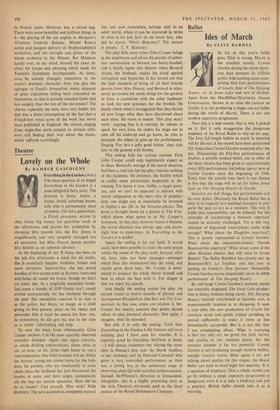Theatre
Lovely on the Whole
By BAMBER GASCOIGNE
At the beginning of Act II Jenny has been on the job five afternoons a week for six weeks. She is manifestly happier, healthier, kinder and more attractive. Squirrel-like, she has stored bundles of five-pound notes in drawers, vases and hidy-holes all round the house, though we don't yet know this. In a magically successful break- fast scene a bundle of £198 (Jenny can't count) arrives anonymously for her husband through the post. His immediate reaction is to take it to the police, but Jenny, as happy as a child giving its first present, plays on his vanity and persuades him it must be meant for him—yes, he remembers, he did give his seat in the tube to a rather rich-looking old lady.
To save his story from whimsicality Giles Cooper anchors it in the most superbly observed everyday dialogue. Again and again remarks, or whole drifting conversations, about what to eat, to wear, to do, strike right home to one's own experience. One brief example will do. When the Actons' young son comes home for the holi- days, his parents, who are emotionally in some chaos since the husband has just discovered the hordes of notes and their origin, immediately ask the boy the routine questions. How did he do in exams? Tied seventh. Who with? With Blakeney. The next question is completely natural but, one now remembers, belongs only to an adult world, where it can be answered in terms of what is his job, how do we know him, who did he marry. `Who's Blakeney?' The answer is simple: 'J. F. Blakeney.'
The play falls away when Giles Cooper brings in the neighbours and allows his parody of subur- ban conversation to become too heavy-handed; and it finally lapses into disaster when Bernard Acton, the husband, makes his stand against corruption and hypocrisy. It has turned out that the high standard of living of all their friends derives from Miss Pimosz, and Bernard is reluc- tantly persuaded (he needs things for the garden) to form a committee with the other husbands to look for new premises for the brothel. He finally rebels when it is suggested that they should all now forget what they have discovered about each other. He starts to mutter 'This play won't work,' arguing that it is corrupt; he refuses to speak his own lines, he orders his stage son to take off his make-up and go home, he tries to persuade the others to give up the performance. Singing 'For he's a jolly good fellow,' they club him to the ground with bottles.
This ending fails for various reasons. First Giles Cooper could only legitimately expect us to share Bernard's outrage if the moral situation had been a real one, but his play contains nothing of the hardness, the pretence, the futility which in reality make prostitution despicable or dis- tressing. For Jenny it was, visibly, a magic pana- cea, and we can't be expected to salivate with moral indignation at the mere idea of prostitu- tion; one might just as reasonably be incensed at Jupiter's sex life in the Metamorphoses. The point is brought home by a glance at The Visit, which shares what seems to be Mr. Cooper's intentions. In that play, however funny it became, the moral dilemma was always ugly and alarm- ingly true to experience. In Everything in the Garden it is neither.
Again the ending is far too bald. It would easily have been possible to make the same points within the mood of the play itself, because, after all, fairy tales too have messages—messages which float like thistledown-into the mind, and maybe grow there later. Mr. Cooper is deter- mined to produce the whole thistle himself and beat us about the face with it. The danger is that we reject his assault.
And finally the ending makes the play the second victim in twelve months of phoney and incompetent Pirandellism (the first was The Con- nection)..In this case, when you analyse it, Mr. Cooper has merely asserted that actors should refuse to play immoral characters. Not quite, I imagine, what he intended.
But still, it is only the ending. Until then Everything in the Garden is the funniest and most winning play I have seen for months. It is superbly acted by Geraldine McEwan as Jenny —I will always remember her tidying the room after la Pimosz's .first visit—by Derek Godfrey as her husband, and by Diarmid Cammell who gives a very controlled performance as their son, a young boy in the adolescent stage of observing adult life with scornful embarrassment. Donald McWhinnie's direction is immaculate. Altogether, this is a highly promising start to the Arts Theatre's six-month spell as the latest annexe of the Royal Shakespeare Company.


































 Previous page
Previous page